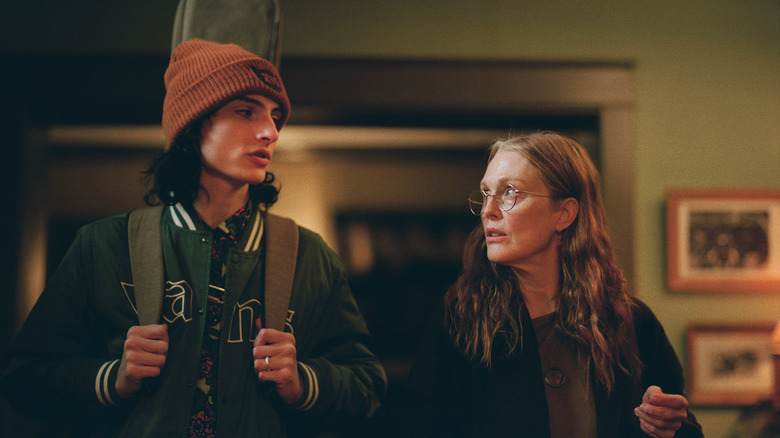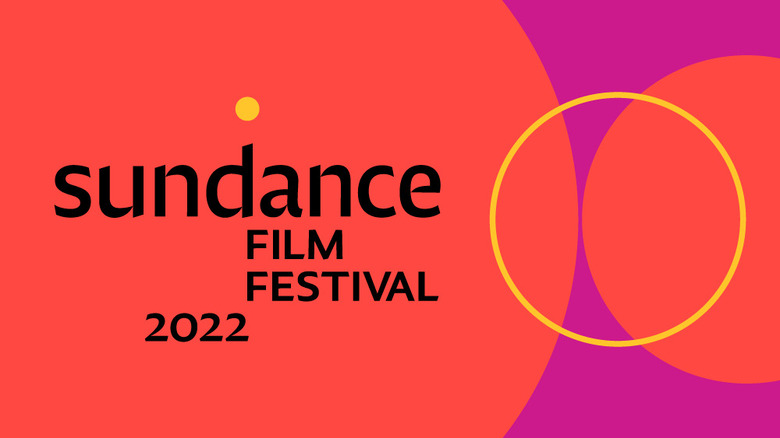When You Finish Saving The World Review: Jesse Eisenberg's Directorial Debut Is An Intentional Cringefest [Sundance 2022]
The time-honored tradition of actors making their directorial debuts at film festivals continues with "When You Finish Saving the World," a muddled indie dramedy from actor turned writer-director Jesse Eisenberg, based on his 2020 audio drama of the same name. It's hard not to see Eisenberg's personality — or rather, his public persona, of a fast-talking, intelligent, somewhat awkward guy — layered throughout the film, with star Finn Wolfhard doing a kind of Eisenberg cosplay the same way every male lead of a Woody Allen movie that isn't Woody Allen is just doing a weird Woody Allen impersonation. Like many actors-turned-filmmakers, Eisenberg takes what he's learned from working with other directors (like, say, Noah Baumbach) and tries to mold it in his own image. The results aren't entirely bad, but they don't quite hit the mark, either. I do think Eisenberg has something in the directing department, and I hope he can grow into a better filmmaker. For now, though, "When You Finish Saving the World" feels like the type of movie made strictly for film festival audiences. A24 has already picked up the movie, but I don't expect the usual A24 fanfare to surround this thing. It will likely slip away, forgotten, and Eisenberg will hopefully spring back with something stronger.
Following a group of characters caught in their own little liberal bubble, the type that thinks a pithy Tweet is all you need to make a real statement, "When You Finish Saving the World" is ultimately the story of a mother and son. Ziggy (Wolfhard) has what he considers a big following online, where he runs a YouTube channel full of videos in which he sits in his bedroom playing rather bad songs. Despite his claims of fame, Ziggy is clearly insecure with himself. He would love to impress Lila (Alisha Boe), a girl in his school committed to social change and activism. As far as Ziggy is concerned, he cares about that stuff too — although it becomes clear that he doesn't actually have a grasp on the issues. He simply parrots things other people are saying while uttering lines of dialogue like, "I thought what you were talking about at lunch was lit!"
Ziggy's mother Evelyn (Julianne Moore, who seems a little lost with this material) runs a shelter for domestic abuse victims, and as far as she's concerned, she's a person of action while Ziggy is all talk. She raised Ziggy to care about Important issues with a capital I, but now she tells her son: "You stopped being interested in anything outside your own little world." In her eyes, Ziggy doesn't want to do the work of learning about important social matters — he just wants to mimic talking points for popularity. And she's not wrong there. But that's not to say Evelyn is on the right path, either. As much as she fancies herself as someone who fights for noble causes, she also appears to be lost in her own little world, too. When a tearful shelter resident comes into her office one day and asks for a hug, claiming Evelyn helped save her life, Evelyn looks downright annoyed, as if she has far more important things to do than offer comfort to someone.
Oblivious
Ziggy and Evelyn have drifted apart over the years. They seem to constantly be at odds, and Evelyn's husband/Ziggy's father (the always-welcome Jay O. Sanders, who should have more screen time here) seems to be adrift as well. When he invites his wife and son to see him receive an award, they both forget to come. In short, this family is fairly dysfunctional, although not irreparably so. Evelyn longs for a connection, and she seems to find it in Kyle (Billy Bryk), a teenager who has just moved into Evelyn's shelter with his mother. In Kyle, Evelyn sees the young man she wishes her son could be. But are her assumptions about Kyle correct, or is she merely projecting her idealized offspring onto this stranger?
Wolfhard is appropriately annoying as Ziggy, a kid who thinks he's very special and can't understand why everyone else doesn't agree with that assessment. He's the type of guy who performs a song in front of a crowd of activists teens and doesn't seem to notice they're all laughing at him. When a friend points out that the crowd was rolling their eyes, Ziggy replies: "What are you talking about? They loved me!" They didn't.
And Evelyn is just as clueless, suggesting college courses for the uber-polite Kyle, even though it's pretty clear he's not interested in those sorts of things. Eisenberg is building towards a kind of reckoning or reconciliation between Ziggy and Evelyn, but the problem is it's hard to actually care if that really happens. These characters aren't unlikable, exactly — but you wouldn't want to spend much time around them, either.
Awkwardness ends up being the name of the game here, with Eisenberg constructing an intentional cringefest; the type of movie that has you squirming uncomfortably as you're forced to watch oblivious characters make total asses of themselves. This approach can be darkly funny, but "When You Finish Saving the World" never quite taps into anything approaching the truth. Do real people behave like the characters here? Absolutely! No question. Twitter is loaded with people who have #resist in their profiles, but who ultimately have nothing to offer other than the occasional comedic dunk or wordy hashtag. But what does "When You Finish Saving the World" have to say about all of this? Nothing, really. What is Eisenberg trying to sell here? I genuinely don't know, and I'm not sure he does, either.
/Film Rating: 5 out of 10

